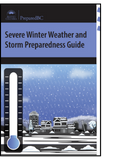Get prepared for a power outage

A power outage is a short- or long-term loss of electric power that can occur in all regions of British Columbia.
Power outages are often caused by severe weather like high winds, freezing rain, hailstorms, and snowstorms. Extreme heat and wildfires may also trigger service interruptions.
During a power outage, you could be without light, heat, air conditioning, and hot water.
To locate confirmed power outages in most areas of British Columbia, go to BC Hydro’s outage map or Fortis BC's outage map.
Before a power outage
Complete a power outage checklist:
- Develop an emergency plan that includes how you and the people you live with will manage service disruptions. Review BC Hydro’s power outage checklist (PDF, 79KB) for additional considerations
- Put together your emergency kit
- Make sure you have enough water and non-perishable food to support your household for a minimum of three days to two weeks. Water requirements are four litres per person per day for drinking and sanitation
- Store the kit in an accessible location that is easy to locate in the dark
- Include a battery-operated radio so you can follow updates and instructions from local officials
- Stow flashlights and extra batteries in easy to access locations around your home
- Install surge protectors to protect electronic devices such as computers
- Get to know your neighbours so you can help each other. Use the In It Together: Neighbourhood Preparedness Guide (PDF, 2.55MB) as an icebreaker
- Ensure you can heat your home safely with a fuel-burning appliance such as a fireplace or gas-powered furnace by:
- Installing carbon monoxide alarms to mitigate the risk of carbon monoxide poisoning
- Having a licensed contractor conduct fireplace or furnace maintenance ahead of winter every year
- Inspecting your chimney or flue (if applicable). This helps prevent structural fires and ensures smoke, carbon monoxide and other potentially harmful gases are properly vented
Never attempt to heat your home with outdoor propane heaters!
People with disabilities or medical conditions
If you or a loved one are managing a disability or medical condition at home, it’s important to consider your unique needs when creating a power outage preparedness plan.
Power outages can disrupt devices and equipment that people with disabilities and medical conditions rely on, for example mobility aids, ventilators and refrigerators for medications. Contact your supplier, health authority, funder, or local emergency program for preparedness advice specific to your devices or equipment.
You should also have a back-up plan for extended outages, such as moving to the home of a friend or family member in an area with power. If this is not an option, go to your local hospital.
If you need assistance during an emergency, call your healthcare provider, 9-1-1 or your local emergency number.
During an outage
- Keep doors of refrigerators and freezers closed. Food in your fridge is usually safe to consume if the power is out for less than four hours. Food in the freezer is usually safe for 24 to 48 hours
- Don't use barbecues or camp stoves indoors
- Be aware of the risks of carbon monoxide poisoning. In the event of a power outage, never heat your home with a gas stovetop or oven. Use gas-powered generators and grills outdoors and away from windows
- If you suspect carbon monoxide poisoning or your carbon monoxide alarm goes off, get outside into fresh air immediately and call 9-1-1 or your local emergency number
For more information on preparing for a power outage, visit the BC Hydro and FortisBC websites.
Download the guide
Find out what to do before, during and after extreme severe weather, storms and power outages.
Severe winter weather and storm preparedness guide (PDF, 12.6MB)
- Français (French)(9.6MB)
- 简体中文 (Simplified Chinese)(9.7MB)
- 繁體中文 (Traditional Chinese)(9.7MB)
- ਪੰਜਾਬੀ (Punjabi)(9.6MB)
For more information or inquiries about this guide, please contact us at PreparedBC@gov.bc.ca.

